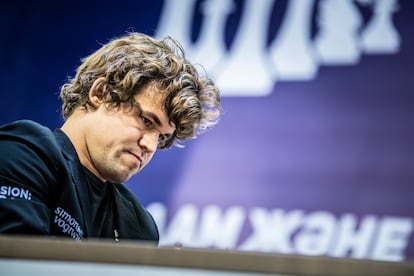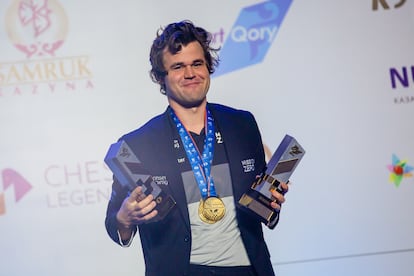Magnus Carlsen: Fifteen world titles and two major problems
The Norwegian champion has renounced defending his classical chess world title and is facing a multi-million dollar lawsuit from Hans Niemann over cheating allegations

“We come into life by chance, and it doesn’t last forever. I want to enjoy it as much as I can and achieve the best version of myself.” This is Magnus Carlsen’s philosophy at the age of 32; he already has 15 world titles to his name after the two he won last week in Almaty, Kazakhstan, in the rapid and blitz categories, and he is a millionaire. But two clouds threaten Carlsen’s blue sky: he has elected not to defend his classical chess world title for fear of losing it, and he is facing a $100 million libel lawsuit after accusing teenage sensation Hans Niemann of cheating.
The idea that Carlsen is afraid to lose requires an important clarification: through his recent interview with youtuber Lex Fridman and several EL PAÍS interviews, it can de deduced that he is not afraid of losing per se, but of losing to someone that he considers clearly inferior. Or in other words, every opponent he has faced in securing five undisputed world titles, with the exception of Fabiano Caruana, whom he faced in London in 2018: “I was not at the top of my game and he was. That made the match very even, which resulted in 12 draws in the slow games and my victory in the rapid tiebreaker. If I had lost that duel, it wouldn’t have been the end of the world. But in the other four I considered myself clearly superior at the time.”
The other contests the Norwegian referred to were against Viswanathan Anand in Chennai (India, 2013) and Sochi (Russia, 2014), Ian Nepomniachtchi (Dubai, 2021) and, above all, Sergey Kariakin in New York in 2016, where Carlsen was made to sweat. After seven drawn games, the champion overextended in his eagerness for victory and lost the eighth game. That night, he and his team got drunk. “It’s the only time I’ve done it as therapy, and it worked. I won one and drew three of the next four, and then I won convincingly in the rapid tiebreaker.”
After beating Nepomniachtchi in Dubai, Carlsen announced he would only defend his title in 2023 if 19-year-old grandmaster Alireza Firouzja, a phenomenon the Norwegian views as an opponent of his stature, won the Candidates Tournament. However, the French-Iranian teenager’s lack of experience betrayed him at the tournament held in Madrid six months ago, where Nepomniachtchi was victorious. Seeing the Russian as no challenge, Carlsen elected to renounce his title, despite the best efforts of the International Chess Federation, which offered what Carlsen has been requesting for some time: speeding up games and playing, for example, 24 over the course of two weeks, at two a day, with rest days. As such, Nepomniachtchi will take on Liren Ding for the world championship title, a player Carlsen considers the “slight favorite” for the title.

Another factor for Carlsen’s decision is the technical, physical and psychological preparation the world title requires: several months of going to bed and waking up thinking about a single person, whom he must crush in a mental boxing match. It is a totally different prospect from the World Rapid Chess Championships, which he has won four times: 2014, 2015, 2019 and 2022. Or the World Blitz Chess Championships, where he has six titles: 2009, 2014, 2017, 2018, 2019 and 2022. Both are exhausting in terms of nervous tension, but the two tournaments are held simultaneously and only last five days: a few weeks of preparation is enough. Carlsen enjoys classical chess tournaments more (he has won 31 of the biggest title), which are usually contested between 10 or 12 players in a league system. Speaking of the difference between the quick and classical versions, Carlsen noted: “If I fail, there will soon be another one to make up for it. But if I lose the world title, it would take years to get it back.”
Carlsen tends to shun rigid training systems. That is why an apparent marriage made in heaven with Garry Kasparov as his coach lasted less than a year. “What I was looking for was access to the brain of one of the greatest chess players in history. And I learned a lot from him, especially in the friendly games we played. But he wanted to impose a strict, almost military regime on me,” Carlsen usually explains of the partnership. “I am thinking about chess, and mentally analyzing a position, practically every hour of practically every day, even when I am walking or skiing or eating, but always without schedules.”
Carlsen has yet to make any public comment on the lawsuit filed by Niemann in Missouri against him, his company Play Magnus Group and chess.com, among others, which claims that Carlsen accused Niemann of cheating without providing any evidence after the American teenager defeated the Norwegian in the third round of the Sinquefield Cup on September 4, 2022.
“My weakest point is controlling my emotions,” Carlsen told this newspaper on December 5, 2016 in New York, after his victory over Kariakin. Everything indicates that this was the case on September 4. On the other hand, it seems he has his emotions fully in check when he wishes to avoid a duel for the world title against opponents who do not motivate him. What does keep Carlsen ticking is the prospect of beating Kasparov’s record, a feat bordering on the impossible: being world number one for 20 consecutive years (1985-2005). To achieve this, Carlsen must remain at the top of the pile for another eight years, when he will be 40. Will he be able to muster the physical and mental energy, and the motivation, to keep scaling Everest for that long? Carlsen has also set himself the goal of surpassing 2900 points on the Elo rating, a feat comparable to a long jumper leaping 10 meters. He currently holds the highest ranking in history of 2882, ahead of Kasparov (2851) and Caruana (2844)
Sign up for our weekly newsletter to get more English-language news coverage from EL PAÍS USA Edition
Tu suscripción se está usando en otro dispositivo
¿Quieres añadir otro usuario a tu suscripción?
Si continúas leyendo en este dispositivo, no se podrá leer en el otro.
FlechaTu suscripción se está usando en otro dispositivo y solo puedes acceder a EL PAÍS desde un dispositivo a la vez.
Si quieres compartir tu cuenta, cambia tu suscripción a la modalidad Premium, así podrás añadir otro usuario. Cada uno accederá con su propia cuenta de email, lo que os permitirá personalizar vuestra experiencia en EL PAÍS.
¿Tienes una suscripción de empresa? Accede aquí para contratar más cuentas.
En el caso de no saber quién está usando tu cuenta, te recomendamos cambiar tu contraseña aquí.
Si decides continuar compartiendo tu cuenta, este mensaje se mostrará en tu dispositivo y en el de la otra persona que está usando tu cuenta de forma indefinida, afectando a tu experiencia de lectura. Puedes consultar aquí los términos y condiciones de la suscripción digital.









































